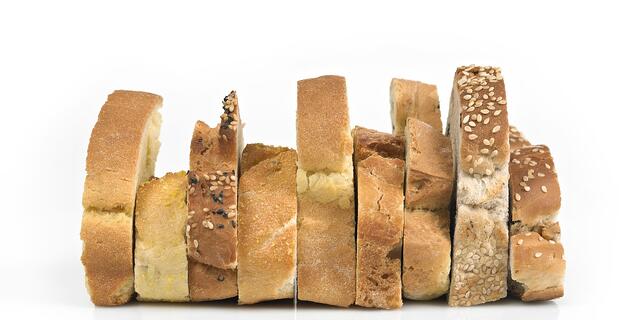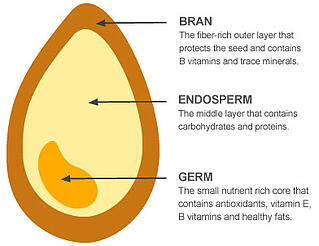Many diet books suggest that cutting grains from your diet will aid in weight loss. However, the USDA recommends eating grains daily, with at least half of those being whole grains. Therefore, unless you have a gluten-intolerance, or another health-related reason to avoid grains, you don't want to miss out on the health benefits of whole grains in your daily diet.

10 Reasons Why We Love Whole Grains
1. The whole is greater than the sum of its parts
Whole grains contain all original parts of the kernel; the bran, the germ and the endosperm, in all original proportions. Refined grains (white bread, pasta, breakfast cereals etc.) are missing fiber and key nutrients because the germ and the bran are stripped away. Make sure the grain is one of the first 3 ingredients listed on the nutrition panel and that "whole" is next to "grain" or "wheat." Beware of the word "enriched!" Enriched is a carefully chosen word to and attempt to put a positive spin on an underlying problem (trying to improve a stripped grain).

2. Whole grains help control weight
You read that right. Whole grains actually help control weight. Therefore, omitting them from your diet will not necessarily aid in weight loss. Omitting whole grains may actually promote weight gain. Whole grains have more fiber and contain 10%-15% protein which helps keep you full and control your hunger.
3. Whole grains help digestion
The fiber in whole grains helps to keep bowel movements regular and ward off diverticulosis. Whole grains also contain lactic acid which promotes "good bacteria" in the large intestines. This "good bacteria" aids in digestion and promotes better nutrient absorption.
4. Whole grains lower blood sugar
Eating foods containing barley lowers blood pressure and improves several other risk factors for heart disease. Whole grains also help increase your intake of potassium which is linked to lower blood pressure.
5. Whole grains reduce risk of heart disease
Dietary fiber in whole grains helps to lower cholesterol by helping your body prevent the absorption of "bad cholesterol." Whole grains may also help lower triglycerides. Lowering both cholesterol and triglycerides aids in reducing the risk for heart disease.
6. Whole grains contain resistant starch
Not all carbs are created equally. It is essential to find the right kind of carb, and carbs with resistant starch are good ones. Carbs with resistant starch act more like a soluble fiber. Resistant starch is not easily digested, therefore it moves slowly through your digestive system. As it digests slowly, more fat is burned in the process, the hormones that make you feel full are incited, your insulin sensitivity is improved, and your blood sugar and cholesterol levels are lowered. Resistant starch feeds the good bacteria in your intestines. Some resistant starches to incorporate into your diet include green bananas (not ripe), cashews, raw oats, cooked and then cooled potatoes.
7. Whole grains are a good source of B vitamins
Whole grains are rich in thiamin, riboflavin, and niacin, which are all involved with metabolism. B vitamins may also help to ease stress, treat anxiety and depression, aid memory, relieve PMS, and reduce heart-risk. Higher doses of riboflavin have been shown to reduce migraine headaches while niacin helps to increase energy and is needed for DNA repair.
8. Whole grains deliver essential minerals
Whole grains contain minerals that our bodies need to build strong bones, produce hormones and regulate our heartbeats. Whole grains contain iron, magnesium, selenium, and zinc. Iron is necessary for carrying oxygen through our blood. Magnesium helps build bones and selenium helps to prevent oxidation and may also help prevent arthritis and certain skin cancers. Zinc is essential in keeping our immune systems in tip-top fighting shape.
9. Whole grains are found in many delicious and nutritious foods
There are many types of foods that contain whole grains which means you are sure to find one that you will enjoy eating. Here are a few natural whole grains: steel-cut oats, popcorn, brown rice, bulgar, barley, wild rice, and quinoa. There are many, many products in grocery stores that contain whole grains, and those are good, too, as long as "whole grain" or "whole wheat" are #1 on the ingredients list and no further down than #3. Also, look for the Whole Grain stamp on grocery products. The Whole Grain Council has incorporated this stamp on products containing whole grains to make them easier to find. 
10. Whole grains are an easy way to make your diet healthier
Learning to enjoy whole grains is a matter of familiarizing your taste buds with the nuttier and fuller flavor and texture of the grain. Whole grains taste and feel a little different, so it will take some time to adjust to the differences. Start choosing whole-grain breads, cereals, bagels and crackers. Enjoy a slice of whole grain toast with an egg in the morning for breakfast. Or, try a bowl of steel-cut oats sweetened with honey and fresh fruit. Look for whole-grain cereal, but keep in mind that just because it's whole grain doesn't mean it's healthy. Be sure to take note of the fiber and sugar content. The less sugar the better. Make popcorn your go-to snack. Avoid the pre-popped kind as it tends to be loaded with butter, sugar or salt.
Challenge yourself to make a change this next month and focus on incorporating whole grains into your diet. These 10 reasons why we love whole grains are 10 reasons to make the change for a healthier you!


